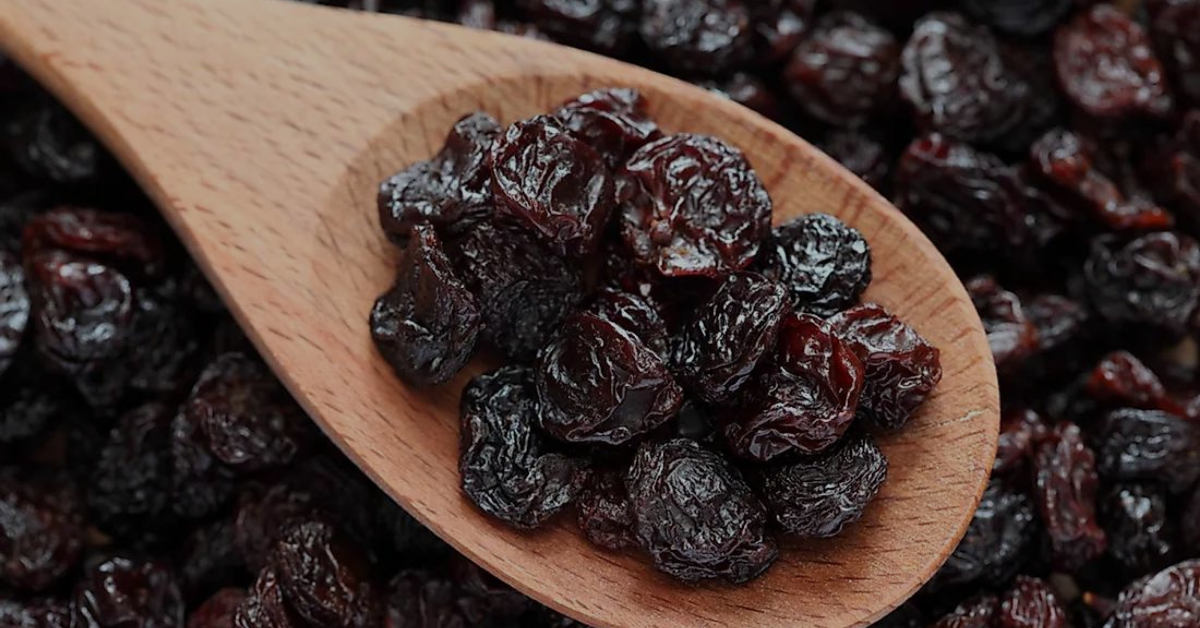Approved By » Esther Howard (Nutritionist) & Dr. Jane Cooper (Expert Dietitian)
Raisins, those little nuggets of sunshine, are more than just a sweet treat.
Packed with essential nutrients and boasting a surprising range of health benefits, these dried grapes have earned their place as a healthy snacking staple.
But are raisins good for you? Let’s delve into the world of raisins, exploring their nutritional profile, potential health benefits, and any potential downsides to consider.
Are Raisins Good for You?
Yes, raisins are good for you. They are a concentrated source of nutrients such as fiber, iron, potassium, and antioxidants.
They offer potential health benefits for digestion, heart health, bone health, and energy levels. However, moderation is key due to their sugar content and calorie density.
It’s advisable to choose unsweetened, organic, and sulfite-free varieties whenever possible.
Key Points:
- Raisins are a concentrated source of nutrients, including fibre, iron, potassium, and antioxidants.
- They offer potential health benefits for digestion, bone health, heart health, and energy levels.
- Moderation is key due to their sugar content and calorie density.
- Choose unsweetened, organic, and sulfite-free varieties whenever possible.
What Happens if You Eat Raisins Everyday?
Eating raisins daily can offer benefits and potential downsides, depending on your intake and health.
On the positive side, raisins provide nutrients like fiber, potassium, and antioxidants, which support digestion, heart health, and cell protection. They can also satisfy sweet cravings naturally.
However, their sugar and calorie density are important to consider. Overconsumption can lead to weight gain, blood sugar spikes, and digestive issues like gas or bloating.
Health Benefits of Raisins
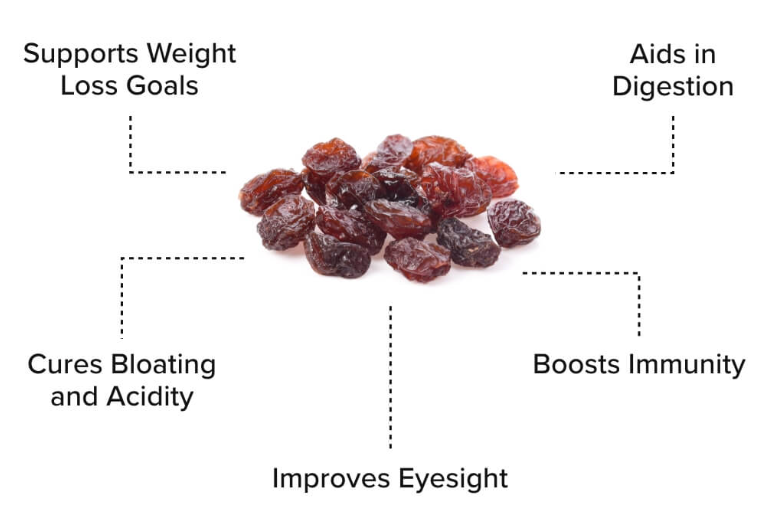
Raisins offer a range of potential health benefits, thanks to their unique nutritional profile. Here are some highlights:
- Heart Helpers: Raisins keep your heart happy by lowering bad cholesterol and helping with blood pressure. Think of them as tiny cheerleaders for your heart!
- Brain & Muscle Boosters: Feeling foggy or sluggish? Raisins are like tiny fuel pellets for your brain and muscles, helping them work their best.
- Gut Guardians: Feeling bloated? Raisins act like a broom for your gut, keeping things moving smoothly and helping with digestion.
- Stronger Skeletons: Want strong bones? Raisins can help! They contribute to keeping your bones healthy so you can stay active and jump for joy.
- Glowing Skin: Raisins might be the secret to healthy, radiant skin! They even help with hair growth, making you feel confident inside and out.
- Diabetes Dance: Managing diabetes can be tough, but raisins can help you feel fuller for longer, potentially leading to less food intake overall.
- Tooth-Friendly Treats: Raisins are good for your teeth! They fight bacteria, don’t stick to your teeth, and keep your mouth healthy.
- Antioxidant Army: Think of antioxidants as tiny shields protecting your body. Raisins have plenty of these shields, potentially keeping your heart healthy.
- Potassium Power: Raisins are packed with potassium, an important mineral for your body.
Remember, while raisins are tiny powerhouses, they do have some calories. Choose unsweetened ones or those with no added sugar to keep your calorie intake in check.
Key Nutrients of Raisins
Despite their diminutive size, raisins pack a punch when it comes to nutrition. Here’s a breakdown of some key nutrients found in a 1/4 cup serving (around 40 grams):
- Calories: 120
- Fiber: 1.5 grams (5% Daily Value)
- Iron: 0.75 mg (5% Daily Value)
- Potassium: 300 mg (5% Daily Value)
- Calcium: 20 mg (2% Daily Value)
- Vitamin C: 0.9 mg (1% Daily Value)
- Boron: 0.2 mg (4% Daily Value)
- Antioxidants: Including polyphenols and catechins
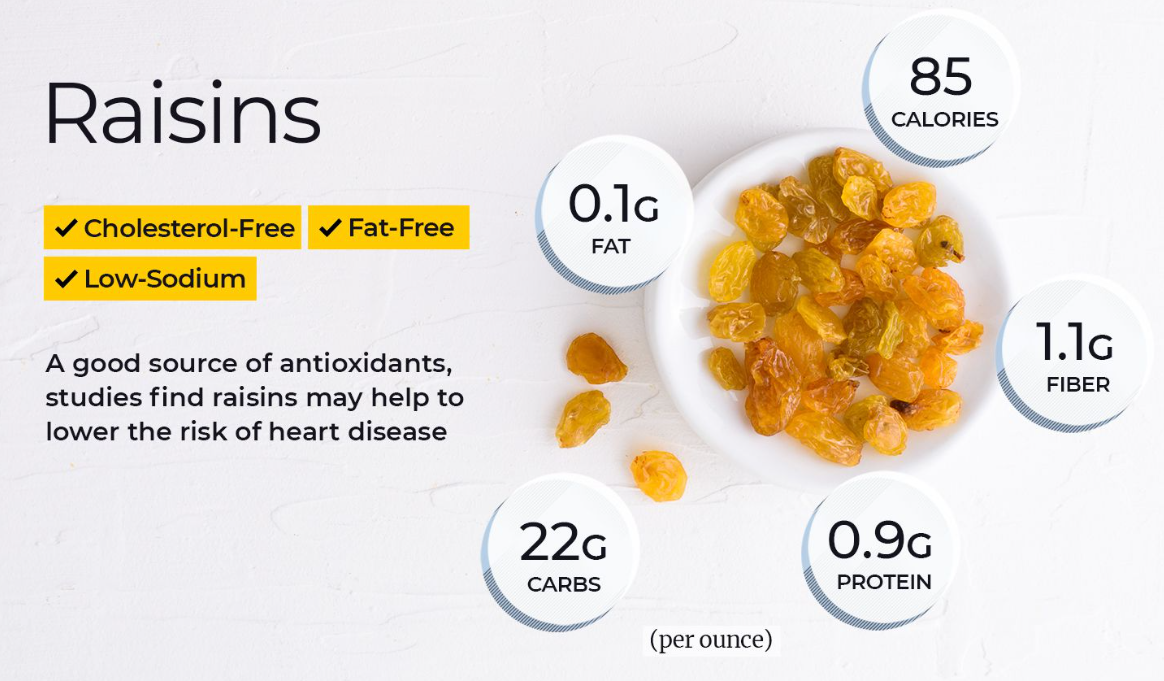
Exploring Specific Health Concerns
While raisins offer general health benefits, they can specifically address certain concerns:
- For Diabetics: While raisins contain sugar, their low glycemic index means they cause a slower rise in blood sugar compared to other sugary foods. Choose unsweetened varieties and manage portion sizes if managing diabetes.
- For Weight Management: The fibre and satiety-promoting properties of raisins may help manage weight by keeping you feeling fuller for longer. However, mindful portion control is crucial.
- For Athletes: The readily available sugar and electrolytes in raisins make them a quick and convenient source of energy during workouts or recovery. Opt for unsweetened varieties to avoid excess sugar intake.
- For Children: Raisins offer a healthy and portable snack option for kids, providing energy, and essential nutrients, and satisfying their sweet tooth naturally. Stick to controlled portions and choose unsweetened varieties to limit sugar intake.
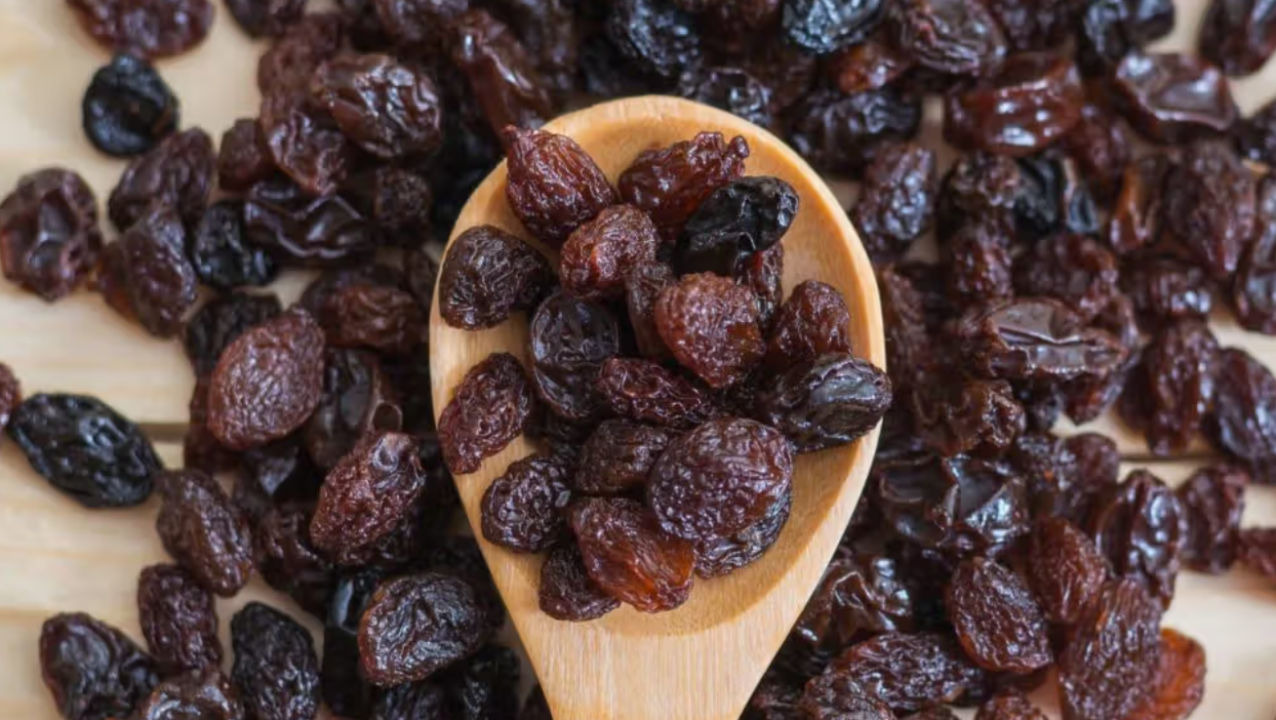
Disadvantages of Eating Raisins
While raisins offer several health benefits, enjoying them in moderation is crucial. Here’s why:
- High in calories: Overindulging can lead to weight gain and increased waist circumference.
- Digestive issues: High fiber content can cause constipation in some individuals.
- Allergic reactions: Some people may be allergic to raisins.
- Pregnancy and breast-feeding: Moderate consumption is advised for pregnant and breastfeeding women.
- Potential downsides: Excessive intake can impact blood pressure, blood sugar, and dental health.
- Chemicals and sugar: Opt for organic raisins and practice good oral hygiene after consuming them.
- Energy crashes: Enjoy raisins with other nutrient-rich foods to avoid sugar crashes.
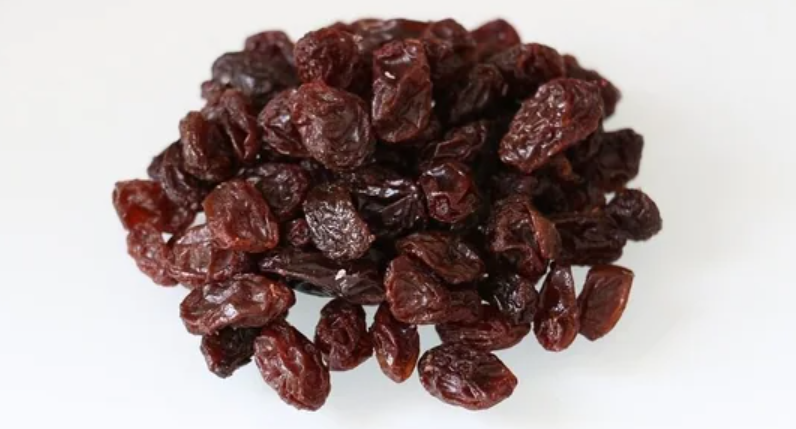
Moderation is Key
While raisins offer numerous benefits, it’s important to enjoy them in moderation. Here are some things to keep in mind:
- Sugar Content: Raisins are naturally high in sugar, so overindulging can contribute to unwanted calorie intake and blood sugar spikes. Stick to recommended serving sizes and choose unsweetened varieties when possible.
- Calorie Density: Their small size makes it easy to overeat raisins without realizing it. Be mindful of portion sizes and pair them with other nutrient-rich foods for a balanced snack.
- Potential for Gastrointestinal Issues: The fibre content in raisins can cause bloating or gas in some individuals. Start with small amounts and gradually increase your intake if tolerated.
Do You Know?
Raisins have been a culinary staple across cultures and throughout history. From their use in ancient Egyptian tombs to their role in traditional Indian sweets, raisins hold cultural significance in many parts of the world. In some cultures, they symbolize longevity, prosperity, and even good luck.
Are Raisins Good for Weight Loss?
Raisins, though small, can be mighty allies in your weight loss journey! Here’s how:
- Nutrient-dense: Packed with vitamins, minerals, and gut-friendly fiber.
- Filling fiber: This helps you feel fuller for longer, reducing calorie intake.
- Low in calories and fat: Sweet treat without excess energy.
- Blood sugar control: Stable blood sugar aids weight management.
- Natural sugar alternative: Satisfies sweet cravings healthily.
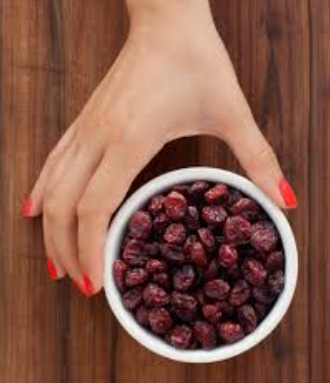
Are Eating Raisins at Night Good for Me?
Raisins, with their trace melatonin and fiber, might seem like a sleep-inducing snack. However, their sugar content and calorie density pose potential downsides.
Benefits:
- Melatonin Boost: May promote sleepiness (though research is limited).
- Fibre Content: Aids digestion and regulates bowel movements.
- Blood Sugar Balance: Soaked raisins may help regulate blood sugar overnight.
- Natural Sweetness: Satisfies sweet cravings without processed sweets.
Downsides:
- Sugar Spikes: Can disrupt sleep and leave you feeling restless.
- Calorie Density: Easy to overeat, leading to unwanted calorie intake.
- Digestive Issues: Fiber may cause bloating or gas, impacting sleep.
- Dental Concerns: Not brushing can increase cavity risk.
Enjoy raisins in moderation and be mindful of potential drawbacks, especially if you have sleep issues. Consider alternative sleep-promoting snacks like chamomile tea, cherry juice, or bananas.
Choosing the Right Raisins
Not all raisins are created equal. Here are some tips for choosing the healthiest varieties:
- Unsweetened: Opt for unsweetened raisins to avoid added sugars and manage your sugar intake.
- Organic: Choose organic raisins to minimize exposure to pesticides and chemicals.
- Sulfite-Free: Some people are sensitive to sulfites used to preserve raisins. Look for sulfite-free options if needed.
- Sun-Dried: Sun-dried raisins retain more natural nutrients compared to those processed with heat.
Raisins: A Versatile Ingredient
Beyond snacking, raisins offer endless culinary possibilities. Here are some ways to incorporate them into your diet:
- Baking: Add sweetness and texture to cookies, muffins, breads, and cakes.
- Trail Mix: Combine with nuts, seeds, and other dried fruits(like dried strawberries) for a portable and nutritious snack.
- Salad Toppings: Add a touch of sweetness and chewy texture to salads.
- Oatmeal and Yogurt: Mix them into oatmeal or yogurt for a boost of flavor and nutrients.
- Energy Bites: Combine raisins with nuts, seeds, and dates for a homemade energy boost.
Raisins and Other Dietary Considerations
- Vegan and Vegetarian Diets: As a plant-based source of iron and other nutrients, raisins can be a valuable addition to vegan and vegetarian diets.
- Gluten-Free Diets: Naturally gluten-free, raisins are a safe and healthy snack for individuals with celiac disease or gluten sensitivity.
- FODMAP Sensitivity: Raisins contain moderate amounts of FODMAPs, fermentable carbohydrates that can trigger digestive issues in some individuals. If you have FODMAP sensitivity, start with small amounts and monitor your tolerance.
How Many Raisins You Can Eat Per Day?
Raisins, those sweet and chewy dried grapes, can be a delightful addition to your diet. The ideal daily portion of raisins depends on various factors, but here are some guidelines:
- Recommended Portion:
- The ideal dose of raisins for a healthy life is approximately 40 grams (about 1.4 ounces) per day. According to research published in the New England Journal of Medicine, consuming 40 grams of dried fruit daily can be beneficial for overall health. It may help protect against cardiovascular diseases, type II diabetes, metabolic syndrome, and hypertension.
- If you don’t have a scale handy, you can use the palm of your hand as a simple measurement tool. For raisins, the recommended portion size is around 40 grams, which can vary based on the type of grape. This portion can range from 100 to 200 raisins.
- Other Perspectives:
- Another guideline suggests that adults should aim for approximately 1/4 cup of raisins per day, which is roughly equivalent to 45-50 grams when dried. This portion provides essential nutrients like fiber, iron, calcium, and magnesium.
- For healthy living, a general recommendation is to consume 80-90 grams (about 1/2 cup) of raisins daily.
- Individual Considerations:
- Keep in mind that individual nutritional needs vary based on factors such as age, gender, physical activity level, and health goals. Adjust your raisin intake accordingly.
- Pregnant women and those with specific health conditions should consult their healthcare provider for personalized advice.
- Types of Raisins:
- Different types of raisins have varying sizes. Here’s a simple table to help you understand how many pieces correspond to 40 grams of raisins:
- Organic Sultana: 120-125 pieces
- Black Jumbo Raisins: 50-55 pieces
- Black Corinth Raisins: 200-210 pieces
- Organic Black Corinth Raisins: 200-210 pieces
- Different types of raisins have varying sizes. Here’s a simple table to help you understand how many pieces correspond to 40 grams of raisins:
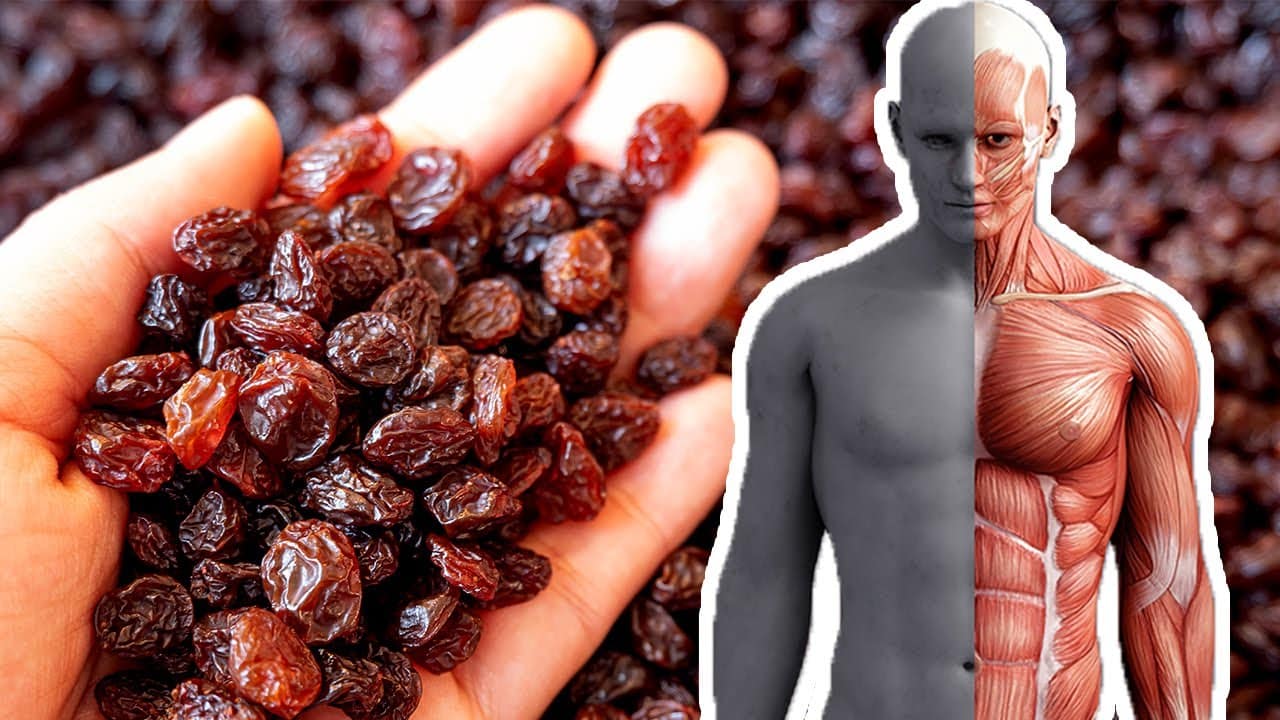
Are Raisins Good for Your Heart?
Raisins have potential heart benefits! The fiber helps lower bad cholesterol, while potassium supports healthy blood pressure.
Studies suggest they might even reduce blood sugar, another good thing for your heart. However, they are also high in sugar and calories.
So, enjoy them in moderation (think 1/4 cup) and choose unsweetened varieties to keep your heart happy and healthy!
Are Raisins Right for You?
So, the answer to the question of whether these raisins are good for you depends on your individual needs and dietary goals.
If you enjoy them in moderation and choose healthy varieties, they can be a valuable addition to a balanced diet.
However, if you have concerns about sugar intake or digestive issues, it’s best to consult your doctor or registered dietitian for personalized advice.

